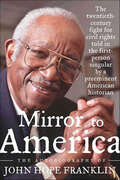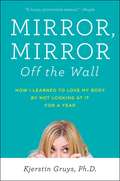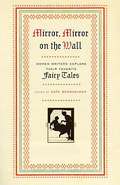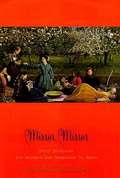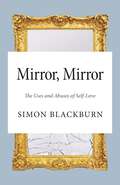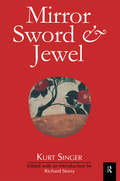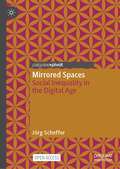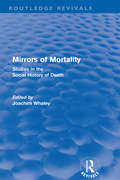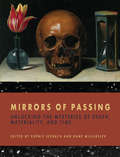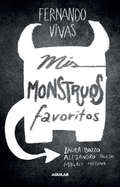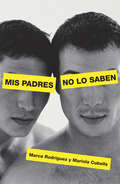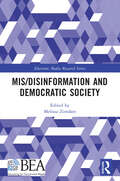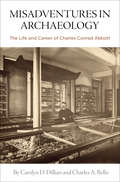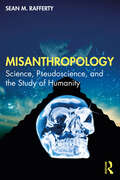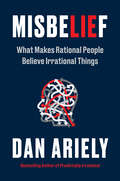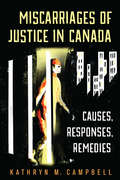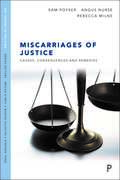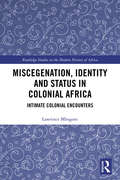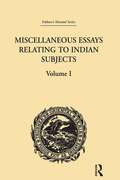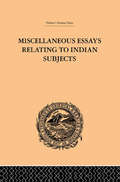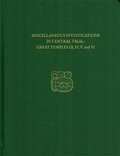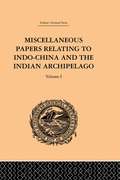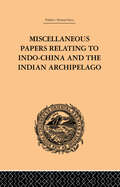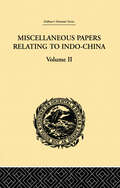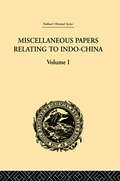- Table View
- List View
Mirror to America: The Autobiography of John Hope Franklin
by John Hope FranklinJohn Hope Franklin lived through America's most defining twentieth-century transformation, the dismantling of legally protected racial segregation. A renowned scholar, he has explored that transformation in its myriad aspects, notably in his 3.5-million-copy bestseller, From Slavery to Freedom. Born in 1915, he, like every other African American, could not help but participate: he was evicted from whites-only train cars, confined to segregated schools, threatened—once with lynching—and consistently subjected to racism's denigration of his humanity. Yet he managed to receive a Ph.D. from Harvard; become the first black historian to assume a full professorship at a white institution, Brooklyn College; and be appointed chair of the University of Chicago's history department and, later, John B. Duke Professor at Duke University. He has reshaped the way African American history is understood and taught and become one of the world's most celebrated historians, garnering over 130 honorary degrees. But Franklin's participation was much more fundamental than that.From his effort in 1934 to hand President Franklin Roosevelt a petition calling for action in response to the Cordie Cheek lynching, to his 1997 appointment by President Clinton to head the President's Initiative on Race, and continuing to the present, Franklin has influenced with determination and dignity the nation's racial conscience. Whether aiding Thurgood Marshall's preparation for arguing Brown v. Board of Education in 1954, marching to Montgomery, Alabama, in 1965, or testifying against Robert Bork's nomination to the Supreme Court in 1987, Franklin has pushed the national conversation on race toward humanity and equality, a life long effort that earned him the Presidential Medal of Freedom, the nation's highest civilian honor, in 1995. Intimate, at times revelatory, Mirror to America chronicles Franklin's life and this nation's racial transformation in the twentieth century, and is a powerful reminder of the extent to which the problem of America remains the problem of color.
Mirror, Mirror Off the Wall
by Kjerstin GruysA scholar, fashionista, and bride-to-be spends a year without mirrors to get a better view of herself, her life, and what's really important. When Kjerstin Gruys became engaged to the love of her life, she was thrilled--until it came time to shop for a wedding dress. Having overcome an eating disorder years before, Gruys found herself struggling to maintain a positive self-image as her pending nuptials imposed a new set of impossible beauty standards. She decided to embark on a bold plan for boosting her self-esteem while refocusing her attention on the beautiful world around her. A memoir of discovery, Mirror Mirror Off the Wall charts Gruys' awakening as she vows to give up mirrors and other reflective surfaces, relying instead on her friends and her fiancé to help her gauge both her appearance and her outlook on life. The result? A renewed focus on what truly matters, regardless of smeared makeup, crooked eyebrows, or messy hair. In the honest, witty, self-aware voice that has made her blog so popular, Gruys explores what it means to be a feminist in a society where femininity is subject to destructive ideals of beauty and sex appeal. Having worked in the fashion industry before becoming a sociologist, Gruys draws on her frontline expertise to explore the gender inequities created by society's obsession with a flawless female body image. Putting a human face on an important issue with humorous and poignant scenes from Gruys' life, Mirror Mirror off the Wall sparks important conversations about body image and reclaiming the power to redefine beauty.
Mirror, Mirror on the Wall: Women Writers Explore Their Favorite Fairy Tales
by Kate BernheimerFairy tales are one of the most enduring forms of literature, their plots retold and characters reimagined for centuries. In this elegant and thought-provoking collection of original essays, Kate Bernheimer brings together twenty-eight leading women writers to discuss how these stories helped shape their imaginations, their craft, and our culture. In poetic narratives, personal histories, and penetrating commentary, the assembled authors bare their soul and challenge received wisdom. Eclectic and wide-ranging, Mirror, Mirror on the Wall is essential reading for anyone who has ever been bewitched by the strange and fanciful realm of fairy tales. Contributors include: Alice Adams, Julia Alvarez, Margaret Atwood, Ann Beattie, Rosellen Brown, A. S. Byatt, Kathryn Davis, Chitra Banerjee Divakaruni, Deborah Eisenberg, Maria Flook, Patricia Foster, Vivian Gornick, Lucy Grealy, bell hooks, Fanny Howe, Fern Kupfer, Ursula K. Le Guin, Carole Maso, Jane Miller, Lydia Millet, Joyce Carol Oates, Connie Porter, Francine Prose, Linda Gray Sexton, Midori Snyder, Fay Weldon, Joy Williams, Terri Windling.
Mirror, Mirror: Forty Folktales for Mothers and Daughters to Share
by Jane Yolen Heidi E. Y. StempleJane Yolen and Heidi Stemple have selected forty folk and fairy stories from all over the world that pay tribute to mothers (good and bad) and their relations (for better or worse) with their daughters.
Mirror, Mirror: The Uses and Abuses of Self-Love
by Simon BlackburnFrom the author of Think, an enlightening and entertaining exploration of narcissism and self-esteemEveryone deplores narcissism, especially in others. The vain are by turns annoying or absurd, offending us whether they are blissfully oblivious or proudly aware of their behavior. But are narcissism and vanity really as bad as they seem? Can we avoid them even if we try? In Mirror, Mirror, Simon Blackburn, the author of such best-selling philosophy books as Think, Being Good, and Lust, says that narcissism, vanity, pride, and self-esteem are more complex than they first appear and have innumerable good and bad forms. Drawing on philosophy, psychology, literature, history, and popular culture, Blackburn offers an enlightening and entertaining exploration of self-love, from the myth of Narcissus and the Christian story of the Fall to today's self-esteem industry.A sparkling mixture of learning, humor, and style, Mirror, Mirror examines what great thinkers have said about self-love—from Aristotle, Cicero, and Erasmus to Rousseau, Adam Smith, Kant, and Iris Murdoch. It considers today’s "me"-related obsessions, such as the “selfie,” plastic surgery, and cosmetic enhancements, and reflects on connected phenomena such as the fatal commodification of social life and the tragic overconfidence of George W. Bush and Tony Blair. Ultimately, Mirror, Mirror shows why self-regard is a necessary and healthy part of life. But it also suggests that we have lost the ability to distinguish—let alone strike a balance—between good and bad forms of self-concern.
Mirror, Sword and Jewel: A Study Of Japanese Characteristics
by Kurt SingerEdited with an Introduction by Richard Storry. First published over 20 years ago and long out of print, this is a unique interpretation of the essence of Japanese society and individual psychology.
Mirrored Spaces: Social Inequality in the Digital Age (Geographies of Media)
by Jörg SchefferThis open access book critically examines discussions on digitalisation and individual opportunities for socio-economic advancement. Contrary to the prevailing narratives of “digital empowerment” and opportunities for every individual, this book argues that digitalisation massively curtails social advancement opportunities, consolidating existing social relations. From a spatial perspective, Scheffer demonstrates how socially disadvantaged groups are faced with reproducing mechanisms as part of a new data economy. Surprisingly, the more intensively digital services are used, the more this happens.Building on Löw´s sociology of space and Bourdieu´s concept of habitus, this book shows how practices of social exclusion are transferred to the digital present in an innovative way. The image of “mirrored” spaces describes a new mechanism that explains social exclusion in the age of digitalisation. This book is an essential resource for researchers and students interested in socio-economic inequalities, processes of digitalisation, and digital geographies.
Mirrors of Mortality: Social Studies in the History of Death (Routledge Revivals)
by Joachim WhaleyFirst published in 1981, this reissue examines mankind’s preoccupation with death and mortality by isolating various societies in different periods of time. The authors examine not only the formal rituals associated with the last rite of passage, but also the social attitudes to death and dying which these rituals evidence. The essays establish that different periods do seem to be characterized by different images of death and attitudes to it, but the authors wisely avoid trying to impose strict chronological pattern. A pioneering work in the historical study of attitudes to death, this reissue should reignite discussion on the significance of death in human history. Christiane Sourvinou-Inwood examines attitudes to death as reflected in myth and religious thought in Ancient Greece and relates them to social and economic change. R. C. Finucane analysis the social significance of the ‘exemplary’ deaths of kings, criminals, traitors and saints in medieval Europe. Paul Fritz’s essay illustrates the importance of royal burials in early modern Britian; while Joachim Whaley examines the social and political significance of funerals in Hamburg between 1500 and 1800. John McManners discusses the work of Phililppe Aries and other prominent French scholars on the history of attitudes to death. David Irwin examines the images of death portrayed in European tombs around 1800. C.A Bayly analyzes the relationship between death ritual and society in Hindu Northern India, while David Cannadine discusses the impact of war on attitudes to death in modern Britain.
Mirrors of Passing: Unlocking the Mysteries of Death, Materiality, and Time
by Rane Willerslev Sophie SeebachWithout exception, all people are faced with the inevitability of death, a stark fact that has immeasurably shaped societies and individual consciousness for the whole of human history. Mirrors of Passing offers a powerful window into this oldest of human preoccupations by investigating the interrelationships of death, materiality, and temporality across far-flung times and places. Stretching as far back as Ancient Egypt and Greece and moving through present-day locales as diverse as Western Europe, Central Asia, and the Arctic, each of the richly illustrated essays collected here draw on a range of disciplinary insights to explore some of the most fundamental, universal questions that confront us.
Mis monstruos favoritos
by Fernando Vivas"Lo que sigue no son biografías resumidas, pero sí he querido detenerme en algunos pasajes esenciales en la formación de cada monstruo y que no han sido cubiertos por la prensa ni por sus biógrafos." He aquí el retrato a mano alzada de tres figuras controversiales de la televisión y la política peruana: Alejandro Toledo, Magaly Medina y Laura Bozzo. Con una mirada crítica y provocadora, Fernando Vivas relata los aspectos más resaltantes e inadvertidos en las vidas de este singular trío, haciendo énfasis en el origen, el auge y la caída de sus ambiciones. Sin llegar al rechazo ni caer en la fascinación ante quienes denominan sus "monstruos favoritos", el autor se ha propuesto desenmascararlos y comprenderlos hasta reconciliarse con ellos. En el camino, estos perfiles dejan al descubierto una parte de la historia peruana contemporánea, así como algunas pistas sobre qué hilos componen nuestra identidad nacional.
Mis padres no lo saben
by Marce Rodríguez Mariola CubellsLos gays y lesbianas españoles opinan abiertamente sobre sus inquietudes, problemas e incomprensiones. Cuando se cumplen cuatro años de la aprobación de la ley del matrimonio homosexual, el presente libro recoge distintas voces de homosexuales que reflexionan sobre su situación actual. Una aproximación sincera y veraz que aborda temas como la adolescencia, la relación con los padres, la aceptación social, la religión, el sida y otros muchos problemas a los que sigue enfrentándose un colectivo cuyo único «pecado» es vivir una opción sexual distinta.
Mis/Disinformation and Democratic Society (Electronic Media Research Series)
by Melissa ZimdarsDrawing on a variety of perspectives and methodologies, this collection explores the intricate relationship between mis- and disinformation and the functioning of democratic society.This book seeks to show how mis- and disinformation is destabilizing our collective confidence in institutions fundamental to the functioning of democratic society, including our electoral processes, our perceptions of trust in government officials and institutions, our healthcare, education, economic, and media systems; and even our communities and interpersonal relationships. Topics covered in this book include the role of Artificial Intelligence in automating deception; how financial crises and journalistic norms in the news industry create favorable conditions for the amplification and laundering of political disinformation; and how our emotional states impact our susceptibility to misinformation. Throughout, the authors provide nuanced definitions of key terms such as “conspiracy theory” and “digital democracy” which help level the field for future research.Mis/Disinformation and Democratic Society is recommended reading for researchers and advanced scholars in this dynamic area of study.
Misadventures in Archaeology: The Life and Career of Charles Conrad Abbott
by Carolyn D. Dillian Charles A. BelloA comprehensive portrait of the controversial self-taught archaeologist C. C. Abbott.In the late nineteenth century, Charles Conrad Abbott, a medical doctor and self-taught archaeologist, gained notoriety for his theories on early humans. He believed in an American Paleolithic, represented by an early Ice Age occupation of the New World that paralleled that of Europe, a popular scientific topic at the time. He attempted to prove that the Trenton gravels—glacial outwash deposits near the Delaware River—contained evidence of an early, primitive population that pre-dated Native Americans. His theories were ultimately overturned in acrimonious public debate with government scientists, most notably William Henry Holmes of the Smithsonian Institution. His experience—and the rise and fall of his scientific reputation—paralleled a major shift in the field toward an increasing professionalization of archaeology (and science as a whole).This is the first biography of Charles Conrad Abbott to address his archaeological research beyond the Paleolithic debate, including his early attempts at historical archaeology on Burlington Island in the Delaware River, and prehistoric Middle Woodland collections made throughout his lifetime at Three Beeches in New Jersey, now the Abbott Farm National Historic Landmark. It also delves into his modestly successful career as a nature writer. As an archaeologist, he held a position with the Peabody Museum at Harvard University and was the first curator of the American Section at the Penn Museum. He also attempted to create a museum of American archaeology at Princeton University. Through various sources including archival letters and diaries, this book provides the most complete picture of the quirky and curmudgeonly, C. C. Abbott.
Misanthropology: Science, Pseudoscience, and the Study of Humanity
by Sean M. RaffertyMisanthropology: Science, Pseudoscience, and the Study of Humanity introduces students to key concepts in critical thinking across the four core branches of anthropology: cultural, linguistic, biological, and archaeological. It combines a critical analysis of anthropology as a field with current concepts in scientific skepticism. By deconstructing a range of global case studies in which anthropological research runs aground, the book teaches students to distinguish between legitimate science and pseudoscience. It covers key concepts in critical thinking and rigorous research, such as cognitive biases and logical fallacies, data collection and consensus, probabilistic thinking, as well as political, nationalist, racist biases. Students learn not only how to apply these concepts to anthropological research and fieldwork, but also to their consumption of everyday information. This book will appeal to anthropology students and will be particularly useful for instructors of introductory anthropology courses, as well as instructors of courses across the humanities and social sciences focused on inculcating critical thinking skills.
Misbelief: What Makes Rational People Believe Irrational Things
by Dr. Dan ArielyThe renowned social scientist, professor, and bestselling author of Predictably Irrational delivers his most urgent and compelling book—an eye-opening exploration of the human side of the misinformation crisis—examining what drives otherwise rational people to adopt deeply irrational beliefs. Misinformation affects all of us on a daily basis—from social media to larger political challenges, from casual conversations in supermarkets, to even our closest relationships. While we recognize the dangers that misinformation poses, the problem is complex—far beyond what policing social media alone can achieve—and too often our limited solutions are shaped by partisan politics and individual interpretations of truth.In Misbelief, preeminent social scientist Dan Ariely argues that to understand the irrational appeal of misinformation, we must first understand the behavior of “misbelief”—the psychological and social journey that leads people to mistrust accepted truths, entertain alternative facts, and even embrace full-blown conspiracy theories. Misinformation, it turns out, appeals to something innate in all of us—on the right and the left—and it is only by understanding this psychology that we can blunt its effects. Grounded in years of study as well as Ariely’s own experience as a target of disinformation, Misbelief is an eye-opening and comprehensive analysis of the psychological drivers that cause otherwise rational people to adopt deeply irrational beliefs. Utilizing the latest research, Ariely reveals the key elements—emotional, cognitive, personality, and social—that drive people down the funnel of false information and mistrust, showing how under the right circumstances, anyone can become a misbeliever.Yet Ariely also offers hope. Even as advanced artificial intelligence has become capable of generating convincing fake news stories at an unprecedented scale, he shows that awareness of these forces fueling misbelief make us, as individuals and as a society, more resilient to its allure. Combating misbelief requires a strategy rooted not in conflict, but in empathy. The sooner we recognize that misbelief is above all else a human problem, the sooner we can become the solution ourselves.
Miscarriages of Justice in Canada: Causes, Responses, Remedies
by Kathryn CampbellInnocent people are regularly convicted of crimes they did not commit. A number of systemic factors have been found to contribute to wrongful convictions, including eyewitness misidentification, false confessions, informant testimony, official misconduct, and faulty forensic evidence. In Miscarriages of Justice in Canada, Kathryn M. Campbell offers an extensive overview of wrongful convictions, bringing together current sociological, criminological, and legal research, as well as current case-law examples. For the first time, information on all known and suspected cases of wrongful conviction in Canada is included and interspersed with discussions of how wrongful convictions happen, how existing remedies to rectify them are inadequate, and how those who have been victimized by these errors are rarely compensated. Campbell reveals that the causes of wrongful convictions are, in fact, avoidable, and that those in the criminal justice system must exercise greater vigilance and openness to the possibility of error if the problem of wrongful conviction is to be resolved.
Miscarriages of Justice: Causes, Consequences and Remedies (Key Themes in Policing)
by Angus Nurse Sam PoyserMiscarriages of justice occur far more frequently than we realise and have the power to ruin people’s lives. It is crucial for criminal justice practitioners to understand them, given significant developments in recent years in law and police codes of practice. This text, part of the Key themes in policing textbook series, is written by three highly experienced authors with expertise in the fields of criminal investigation, forensic psychology and law and provides an up-to-date and comprehensive analysis of miscarriages of justice. They highlight difficulties in defining miscarriages of justice, examine their dimensions, forms, scale and impact and explore key cases and their causes. Discussing informal and formal remedies against miscarriages of justice, such as campaigns and the role of the media and the Court of Appeal and the Criminal Cases Review Commission (CCRC), they highlight criticism of the activities and decision-making of the latter and examine changes to police investigation in this area. Designed to incorporate ‘evidence-based policing’, each chapter provides questions reflecting on the issues raised in the text and suggestions for further reading.
Miscegenation, Identity and Status in Colonial Africa: Intimate Colonial Encounters (Routledge Studies in the Modern History of Africa)
by Lawrence MbogoniThroughout the nineteenth and early twentieth centuries the colonial administrations in British East-Central African colonies considered inter-racial sexual liaisons to be a serious and recurrent "problem". Consequently, inter-racial sexual liaisons (concubinage and marriage) and the mixed race progeny that resulted from these liaisons led to protracted discussions and enactment of policies which addressed questions about concubinage, marriage, racial identity, sexual morality, and the status of persons of mixed race in British East-Central Africa. Using archival sources and secondary literature, the author highlights how colonial inter-racial intimate encounters became intertwined with conceptions of ‘race’ and what it meant to be European, African ("native") and racially mixed. Intended for students and scholars interested in the study of ‘race’ and sexuality in colonial Africa, the book will provide an understanding of why inter-racial liaisons despite of rigid racial barriers were not easy to legislate against.
Miscellaneous Essays Relating to Indian Subjects: Volume I
by Brian Houghton HodgsonFirst Published in 2000. This text is a compliation of essays on the Kocch, Bobo and Dhimal Tribes and Himalayan Ethnology, includes vocabulary and translation notes from the author accounts in 1880.
Miscellaneous Essays Relating to Indian Subjects: Volume II
by Brian Houghton HodgsonThis is Volume VII of fourteen on a series on India: Language and Literature. Originally published in 1180 this is second part of a collection of miscellaneous essays on the subject of India, including topics of comparisons of vocabulary, the Aborigines of North-East, Eastern India, Tibetans, the Mongolian words, the aborigines of Central India, amongst other.
Miscellaneous Investigations in Central Tikal--Great Temples III, IV, V, and VI: Tikal Report 23B
by H. Stanley LotenThe Maya center of Tikal, in Guatemala, is famous for its well-preserved architecture. This book presents detailed descriptions of four of the six Great Temples that dominate Tikal's city center. Whereas Great Temples I and II were published in 1990 in Tikal Report 14, the four structures presented here are Great Temples III, IV, V, and VI. All but Great Temple V represent Late Classic construction and can be associated with known rulers.It is tempting to think of these structures as funerary monuments, but this is only a supposition. Their relationship with rulers may have been much more complex. This report is the primary record of these important buildings in Tikal's urban landscape. It provides clear, precise, and usable architectural analyses for Mayanists, archaeologists, art historians, architectural historians, urbanists, and those interested in construction techniques and in the uses of Maya buildings.University Museum Monograph, 146
Miscellaneous Papers Relating to Indo-China and the Indian Archipelago: Volume I (Trubner's Oriental Ser.)
by Reinhold RostFirst Published in 2000. Routledge is an imprint of Taylor & Francis, an informa company.
Miscellaneous Papers Relating to Indo-China and the Indian Archipelago: Volume II
by Reinhold RostPublished in 2013, Miscellaneous Papers Relating to Indo-China and the Indian Archipelago: Volume II is a valuable contirbution to the field of Asian Studies.
Miscellaneous Papers Relating to Indo-China: Reprinted For The Straits Branch Of The Royal Asiatic Society From Dalrymple's Oriental Repertory, And The Asiatic Researches And Journal Of The Asiatic Society Of Bengal, Volume 1
by Reinhold RostFirst Published in 2000. Routledge is an imprint of Taylor & Francis, an informa company.
Miscellaneous Papers Relating to Indo-China: Reprinted For The Straits Branch Of The Royal Asiatic Society From Dalrymple's Oriental Repertory, And The Asiatic Researches And Journal Of The Asiatic Society Of Bengal, Volume 1
by Reinhold RostFirst Published in 2000. Miscellaneous Papers Relating to Indo-China and the Indian Archipelago: Volume I is a valuable contribution to the field of Asian Studies.
